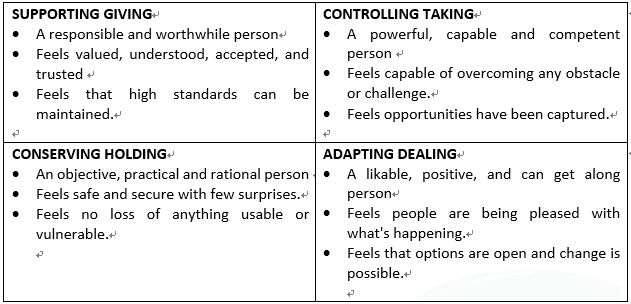How Our Four Basic Identities Get Stressed Differently?
Imagine that you and three of your friends decided to go on a road trip, you prepared everything, took the car, and headed to the suburbs. Everything is perfect, fresh air, amazing landscape, and perfect weather. And suddenly the car stopped! You went to check the engine and you found it broken down. You are in a remote area at least 50km from any city and there is no cellular coverage. You have been waiting for two hours now and no single car passed by! How each one of you will react?
Simon started to blame himself for being a part of the problem, he started to say things like: "I had to check on the car before we move, I should have prepared a better plan".
Chris on the other hand didn’t like the waiting. He shouted, “We have to go”. He started to order everyone to get what they can carry from the car and we will start walking until we find a solution.
Henry refused what Chris is trying to do, he said “I will not move a foot until I know what exactly what I will do and where I'm heading to. We need to analyze the situation first, we need to put a plan before we take one step. We don’t know what we may face on this road".
While the discussion seems endless for you, you started to use your sense of humor and making jokes out of the situation, trying to cool things down, trying to reassure them that everything will be alright.
When Chris failed to convince anyone with leaving the car and walk down the road, he decided that he will go by himself. He started to put on his back bag, giving everyone an angry goodbye look. Simon got very emotional, he was about to cry. Henry went back to the car to check the engine for the 10th time, while you had this confused look on your face, you don’t know to whether leave or stay.
At this exact moment, the sound of a large truck broke the silence. The truck driver managed to pull your car, while the four of you stayed inside of it looking at each other in silence. You were asking yourself one question:
Why each one of us had a different reaction to the situation, and why all our reactions were exaggerated?
The Four Basic Identities
According to our research, there are four basic identities or life orientations which are: Supporting Giving, Controlling Taking, Adapting Dealing, and Conserving Holding. Our basic identities define the way we want to be seen by ourselves and others in the way that makes us most proud of ourselves. In regular situations, those life orientations are our unique behavioral strengths. Let's take a closer look at each one of them and then let's discuss how stress turns those behavioral strengths into exaggerated excess.

When our basic identity is confirmed, or when we believe it will be confirmed, we feel in control, safe and secure. But when it is disconfirmed, we feel threatened.
To head off the ill effects of stress on productivity, we need to cultivate stress awareness. We need to better understand why those alarms — the source problems — are problems. What’s at stake if we miss a deadline? What can happen if we fail? What does it matter if somebody resists what we want to accomplish?
Alarms stress us out because they threaten our basic identities. they bring with them the possibility of losing control over the way we want to be seen by ourselves and others in the way that makes us most proud of ourselves. We all want to confirm our identities, to like ourselves for being the kinds of people we admire.
When these basic identities are threatened by any one of the source problems, stress inevitably follows. If the source problem is solved, the stress is productive and leads to High Performance. If the problem is not solved, low performance can follow, and if it persists, it can, in the extreme lead to burnout or blowout.
For more about this topic, download our latest book "High Performance Management Under Stress" for FREE:
